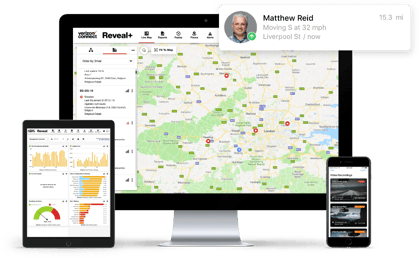Fleet management tech can help boost the services industry
Discover key insights into how fleet management technology can help businesses in the services industry.
Read more
Services are crucial to the UK economy. In fact, it’s dominated by this industry with the service industries accounting for “81% of total UK economic output (Gross Value Added) and 85% of UK workers”. (1)
According to research, service industries contributed £1.7 trillion in Gross Value Added (GVA) to the UK economy (2).
This industry is also a key sector affected by the current global economic situation and with Britain’s economy “forecast to grow by 2.0% next year”(3)businesses have to be ready. Not only do they need strong foundations and the tools to boost efficiency, they also have to prioritise cost savings, sustainability and customer loyalty.
Companies in the service sector should focus on establishing a strong foundation and critically reviewing their operational efficiency, performance, cost-effectiveness, environmental sustainability, and fleet emissions.
Additionally, they should prioritise developing a strategy that centres around customer satisfaction to be able to enhance their overall performance.
The good news is that advanced telematics technology can help transform businesses in the service industry allowing them to work smarter - not harder.
Let’s dive a little deeper:
Everyday responsibilities often prevent fleet managers from having the time to assess the performance of their vehicle fleet. If they were to use sophisticated fleet management technology, they would be able to obtain both a comprehensive and detailed view of the areas where operational costs could be reduced.
A good starting point for any company is to have a detailed overview of its operating costs. This includes knowing the fleet’s total fuel usage and the specific fuel consumption for each vehicle, the cost per operation, and identifying hidden costs that not only increase fuel consumption but also put the safety of equipment and vehicles at risk.
Factors such as excessive speeding, prolonged vehicle idling, insufficient vehicle maintenance, and suboptimal route planning could be diminishing the profitability of the business and unnecessarily increasing operational costs.
Regularly analysing operational efficiency is essential for businesses to enhance cost-effectiveness, strengthen their competitive edge and increase profitability.
In fact, companies in the service industry that have implemented telematics have managed to achieve reductions in fuel costs (22%), accident costs (20%), labour costs (20%), vehicle maintenance costs (14%), and insurance costs (22%).
Download our report: Advanced Fleet Management for the Services Industry 2025 and discover how GPS tracking technologies are shaping the service industry.
Customer centric culture is a game changer for the service industry, which is why it’s necessary to provide accurate ETAs (estimated time of arrival) in order to build trust. By sharing meaningful information with customers, they become more engaged in the process, gaining insight and exerting a degree of control over the scheduled operation and service.
This extra level of trust can help promote customer retention and loyalty, which is key for companies.
According to our latest Fleet Technology Trends survey, fleets in the service industry in Europe improved their customer service by 55% after implementing telematics technology.
Download the new Advanced Fleet Management for the Services Industry 2025 and discover how GPS tracking technologies are improving the day-to-day operations of companies in the service industry.
Safety must be a fundamental pillar for any responsible company. Promoting a safe environment where workers can carry out their activities in safe conditions is essential.
For businesses that rely on vehicle use, factors like ensuring vehicles are well-maintained, selecting safe routes, and effectively planning the workday are crucial to keeping the equipment in a safe working condition.
Advanced telematics can help you in all these areas, which is a great way to prioritise the safety of your team and enables you to improve safety measures in a comprehensive way.
In fact, the latest Fleet Technology Trends Survey in Europe revealed that 43% of European fleets improved driver safety habits and 36% decreased speeding and harsh driving with the help of an advanced fleet management solution.
Tags: Cost control, Customer service, Productivity & efficiency




Find out how our platform gives you the visibility you need to get more done.
Discover key insights into how fleet management technology can help businesses in the services industry.
Read moreThe 2023 Fleet Technology Trends Report for the UK and Europe revealed for the second year in a row, that customer service...
Read moreHow GPS fleet tracking can help streamline your operations
Read moreTransform your safety and improve customer service and productivity with GPS fleet tracking technology.
Read more